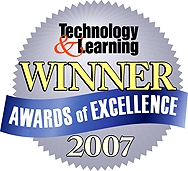
 Apangea Learning is pleased to announce that SmartHelp has been honored with the prestigious 2007 Award of Excellence from Technology & Learning magazine, a leading education technology publication. Apangea Learning SmartHelp has been selected as one of the best education offerings of the past year and will be showcased in Technology & Learning’s December Awards Issue and featured online at http://www.techlearning.com.
Apangea Learning is pleased to announce that SmartHelp has been honored with the prestigious 2007 Award of Excellence from Technology & Learning magazine, a leading education technology publication. Apangea Learning SmartHelp has been selected as one of the best education offerings of the past year and will be showcased in Technology & Learning’s December Awards Issue and featured online at http://www.techlearning.com.
All entries are given a rigorous test-driving by qualified educators in several rounds of judging. The products are then carefully screened by the Technology & Learning editorial team. Evaluation criteria for all entries include: quality and effectiveness, ease of use, creative use of technology, and suitability for use in an educational environment.
Technology & Learning‘s Awards of Excellence program has been recognizing outstanding education technology products for the last quarter century. With a solid reputation in the industry as a longstanding, high quality program, the Awards of Excellence recognize the “best of the best” that help educators in the business of teaching, training and managing with technology.
“Technology & Learning is constantly recognized for its commitment to excellence, receiving several of the industry’s top media accolades. It is a true honor to be recognized by Technology & Learning and be the recipient of its 2007 Award of Excellence,” expressed Apangea Learning CEO Louis Piconi. “I am very proud of the work and dedication of my entire team and all of our customers who have contributed great ideas to the development of SmartHelp.”
SmartHelp provides one-on-one differentiated math instruction via Web-based technology that integrates its innovative intelligent tutoring system with live one-on-one human tutors. Based on one of the world’s largest bodies of cognitive research, it utilizes a skills-based problem solving process that teaches students how to break down problems into manageable steps. Its content can be tailored to meet the learning needs of fifth grade to college students, and is ideal for supplemental instruction, remediation, intervention, advanced study or after class programs. In accordance with best practices in serving English Language Learners (ELL), SmartHelp supports eight languages: English, Spanish, French, Portuguese, German, Japanese, Mandarin Chinese and Korean.
The latest version of SmartHelp has a number of new features including:
· Multi-tiered instructional escalation model for moving students from automated feedback to multiple levels of certified teacher intervention.
· Built-in motivation program that rewards student progress with points that are redeemable for age-appropriate gift cards.
· Advanced real-time reports that isolate specific district, class and student data – even identifying the specific skill challenging a single student.
· Expanded and restructured algebra content to facilitate scaffolding into Algebra 2 and beyond.
· Correlated learning pathways that integrate individual student needs, while automatically correlating content to any state’s standards.
· Our unique “Solve it Now” feature which allows students to bypass content they know, enabling them to focus on the content they truly need.


